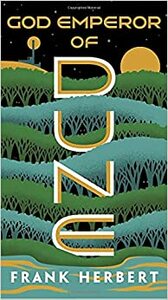You need to sign in or sign up before continuing.
Take a photo of a barcode or cover
challenging
emotional
informative
reflective
sad
slow-paced
Plot or Character Driven:
Character
Strong character development:
Yes
Loveable characters:
Complicated
Diverse cast of characters:
Yes
Flaws of characters a main focus:
Complicated
Top tier for me. Heady, philosophical, poetic explorations of consciousness and the bounds of human experience. These themes are heavy in all of the Dune books, but this one most so. If that’s not your jam, it may feel overly dense and confusing.
challenging
dark
mysterious
reflective
slow-paced
Plot or Character Driven:
Character
Strong character development:
Complicated
Loveable characters:
Complicated
Diverse cast of characters:
Yes
Flaws of characters a main focus:
Complicated
Much more steadily paced through the whole book than Children of Dune but doesn't have any specific high points. Wraps up fairly nicely compared to Children as well. Might continue at some point but right now I need a break from Dune.
Almost feels like a good dropping off point. A lot of this went over my head, but it didn't feel all that clear for the most part either. Where I liked both the character drama and rich thematic exploration of the previous entries, these characters felt a little flat. The themes of the series as a whole really do come to fruition in this entry though, so it was absolutely worth sticking around for that. A mixed three stars.
At the heart of the novel is Leto II, the God Emperor—a being who embodies both the House of Atreides’ human legacy and the supernatural force of the sandworm. The title perfectly captures his duality, reinforced by striking lines like, “This planet is the child of the worm and I am that worm.”
Leto’s transformation has given him near-immortality, along with complete control over Arrakis and its most precious resource, spice. His memories remain unaltered, allowing him to speak in his father Paul’s voice, making it clear that Muad’Dib still lingers in some form. Yet despite his godlike power, cracks emerge in his empire. A stolen collection of his journals reveals deep and complex insights into his rule, offering a glimpse into the mind of a being burdened by omniscience.
Key figures like Moneo, the father of Siona, and Nayla, a Fremen warrior, play crucial roles in the unfolding drama. Meanwhile, the presence of yet another Duncan Idaho—a ghola cloned from the original—raises questions about identity and continuity. Leto refers to them collectively as the Duncans, as if they are interchangeable. The revelation that there have been 19 iterations already is both eerie and telling of how history repeats itself under Leto’s rule.
One of the novel’s most compelling aspects is its shifting narrative style, alternating between traditional storytelling and an investigative, documentary-like tone (“Research has shown…”). This structure deepens the sense that we are reading both history and prophecy.
Themes of gender and control take center stage, particularly in Leto’s obsession with creating an all-female army—the Fish Speakers—and his views on sexuality. He himself is essentially sexless due to his transformation, yet he holds a particular interest in Siona, though not romantically. The arranged marriage with Hwi is one of the most unsettling aspects of the novel. Leto forces the union upon her, exerting absolute control over her fate, all while she and Duncan Idaho share a genuine love. The resulting entanglement of relationships—Leto, Hwi, Idaho, and Siona—adds another layer of tension to the story.
The novel’s terminology and world-building remain as rich as ever. The concepts of the Fish Speakers and Face Dancers stand out, as does the vivid description of Leto’s hybrid worm-body—something both grotesque and awe-inspiring.
The dramatic finale is both visually stunning and narratively intense. Leto’s death is a truly climactic moment, written with the kind of vivid imagery that makes Herbert’s work so compelling. His passing marks the end of an era, and the question of what Siona will become in its wake lingers, setting up the future of the Dune universe.
emotional
hopeful
mysterious
reflective
tense
slow-paced
Plot or Character Driven:
Character
Strong character development:
Yes
Loveable characters:
Yes
Diverse cast of characters:
Yes
Flaws of characters a main focus:
Yes
challenging
dark
informative
mysterious
reflective
slow-paced
Plot or Character Driven:
A mix
Strong character development:
Complicated
Loveable characters:
Complicated
Diverse cast of characters:
Yes
Flaws of characters a main focus:
Complicated
I love reading Frank Herbert’s philosophies, but this was a little too lecture-y even for me.






